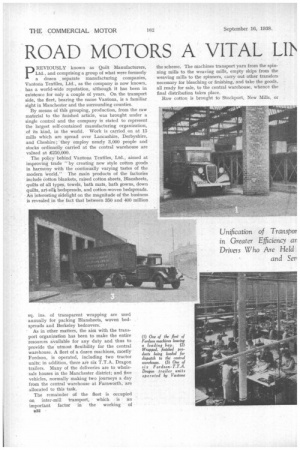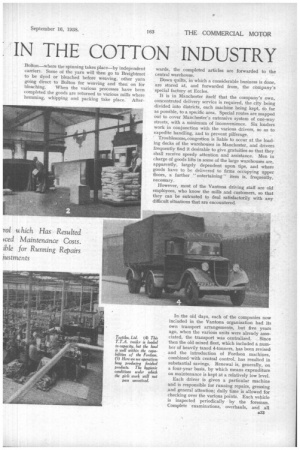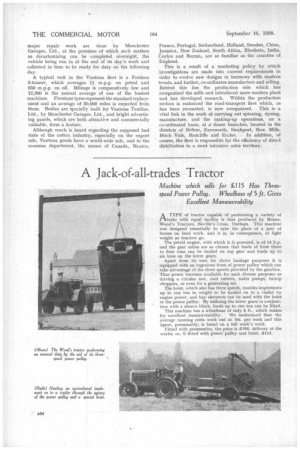ROAD MOTORS A VITAL L11\ IN THE COTTON INDUSTRY
Page 42

Page 43

Page 44

If you've noticed an error in this article please click here to report it so we can fix it.
pREVIOUSLY known as Quilt Manufacturers, Ltd., and comprising a group of what were formerly a dozen . separate manufacturing companies, Vantona Textiles, Ltd., as the company is now known, has a world-wide reputation, although it has been in existence for only a couple of years. On the transport side, the fleet, bearing the name Vantona, is a familiar sight in Manchester and the surrounding counties.
By means of this grouping, production, from the raw material to the finished article, was brought under a single control and the company is stated to represent the largest self-contained manufacturing organization, of its kind, in the world. Work is carried on at 15 mills which are spread over Lancashire, Derbyshire, and Cheshire ; . they employ nearly 3,000 people and stocks ordinarily carried at the central warehouse are valued at 050,000.
The policy behind Vantona Textiles, Ltd., aimed at improving trade "by creating new style cotton goods in harmony with the continually varying tastes of the modern 'world." The main products of the factories include eotton blankets, raised cotton sheets, Blansheets, quilts of all types, towels, bath mats, bath gowns, down quilts, art-silk bedspreads, and cotton-woven bedspreads.
• An interesting sidelight on the magnitude of the business is revealed in the fact that between 350 and 400 million sq. ins, of transparent wrapping are used annually for packing Blansheets, woven bedspreads and Berkeley bedcovers.
• As in other matters, the aim with the transport organization has been to make the entire resources available for any duty and thus to provide the utmost flexibility for the central warehouse. A fleet of a dozen machines, mostly Fordson, is operated, including two tractor units; in addition, there are six T.T.A. Dragon trailers. Many of the deliveries are to wholesale houses in the Manchester district; and five vehicles, normally making two journeys a day from the central warehouse at Farnworth, are allocated to this task.
The remainder of the fleet is occupied on inter-mill transport, which is an important factor in the working of the scheme. The machines transport yarn from the spinning mills to the weaving mills, empty skips from the weaving mills to the spinners, carry out other transfers necessary for bleaching or finishing, and take the goods, all ready for sale, to the central warehouse, whence the final distribution takes place.
Raw cotton is brought to Stockport, New Mills, or Bolton—where the spinning takes place—by independent carriers. Some of the yarn will then go to Breightmet to be dyed or bleached before weaving, other yarn going direct to Bolton for weaving and then on for bleaching. When the various processes have been completed the goods are returned to various mills where hemming, whipping and packing take place. After wards, the completed articles are forwarded to the central warehouse.
Down quilts, in which a considerable business is done, are stored at, and forwarded from, the company's speCial factory at Eccles.
It is in Manchester itself that the company's own, concentrated delivery service is required, the city being divided into districts, each machine being kept, so far as passible, to a specific area. Special routes are mapped out to cover Manchester's extensive system of one-way streets, with a minimum of inconvenience. Six loaders work in conjunction with the various drivers, so as to expedite handling, and to prevent pilferage. • ' Troublesome congestion is liable to occur at the loading decks of the warehouses in Manchester, and drivers frequently find it desirable to give gratuities so that they shall receive speedy attention and assistance. Men in charge of goods lifts in some of the large warehouses are, apparently, largely dependent upon tips, and where goods have to be delivered to firms occupying upper floors, a further " entertaining " item is, frequently, necessary.
However, most of the Vantona driving staff are old employees, who know the mills .and customers, so that they can be entrusted to deal satisfactorily with any difficult situations that are encountered.
In the old days, each of the companies now inc:uded in the Vantona organization had its own transport arrangements, but five years ago, when the various units were already asso
ciated, the transport was centralized. Since then the old mixed fleet, which included a number of heavily taxed 4-tanners, has been revised and the introduction of Fordson machines, combined with central control, has resulted in substantial savings. Renewal is, generally, on a four-year basis, by which means expenditure on maintenance is kept at a relatively low level.
Each driver is given a particular machine and is responsible for running repairs, greasing And general attention; daily time is allowed for checking over the various Points. Each vehicle is inspected periodically by the foreman. Complete examinations, overhauls, and all
major repair work are done by Manchester Garages, Ltd., at the premises of which such matters as decarbonizing can be completed overnight, the vehicle being run in at the end of its day's work and collected in time to be ready for duty on the following day. •
A typical unit in the Vantona fleet is a Fordson 2-tonner, which averages 11 m.p.g. on petrol and 650 m.p.g. on oil. Mileage is comparatively low and 12,000 is the annual average of one of the busiest machines. Firestone tyres represent the standard replacement and an average of 30,000 miles is expected from them. Bodies are 'specially built for Vantona Textiles. Ltd., by Manchester Garages, Ltd., and bright advertising panels, which are both attractive and commercially valuable, form a feature.
Although much is heard regarding the supposed bad state of the cotton industry, especially on the export side, Vantona goods have a world-wide le, and to the overseas department, the names of Canada, Mexico, France, Portugal, Switzerland, Holland, Sweden, China, Jamaica, New Zealand, South Africa, Rhodesia, India, Ceylon and Burma, are as familiar as the counties of England.
This is a result of a marketing policy by which investigations are made into current requirements in order to evolve new designs in harmony with modern trends, and further, co-ordinates manufacture and selling. Behind this lies the production side which has reorganized the mills and introduced more modern plant and has developed research. Within the production section is embraced the road-transport fleet which, as has been recounted, is now reorganized. This is a vital link in the work of carrying out spinning, dyeing, manufacture, and the making-up operations, on a co-ordinated basis, at a' dozen branches, located in the districts of Bolton, Farnworth, Stockport, New Mills,
Birch Vale, Radcliffe and Eccles. In addition, of course, the fleet is responsible for the efficiency of direct distribution in a most intensive sales territory.




















































































